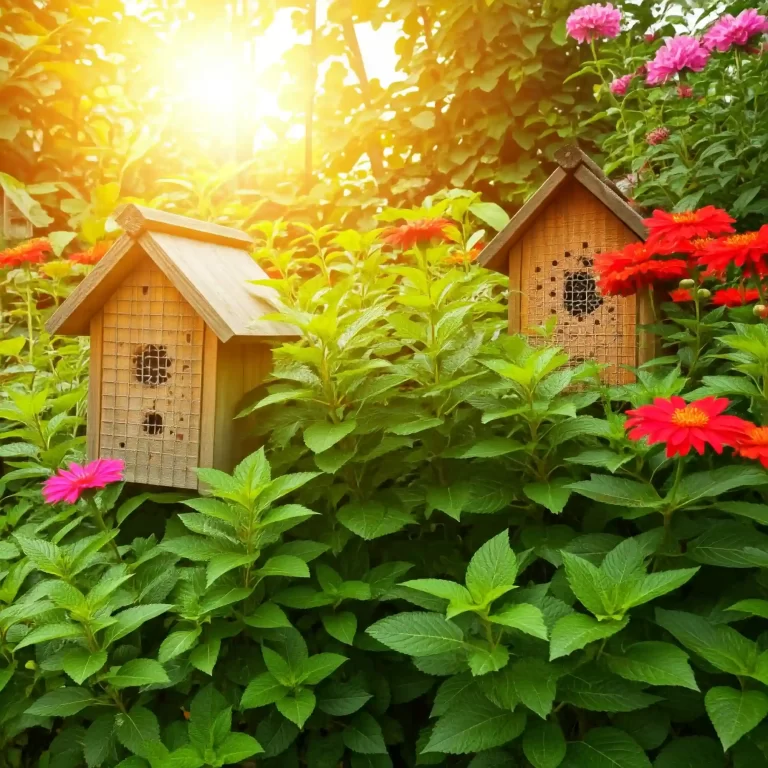| Benefit | Description |
|---|---|
| Healthy Gardens | Thriving plants, free from harmful residues |
| Sustainable Practices | Protects natural resources and promotes long-term soil health |
| Environmental Responsibility | Reduces reliance on toxic chemicals, safeguarding beneficial insects and wildlife |
How Organic Pest Control Keeps Your Garden Thriving (and You Smiling!)
Howdy farmers! Sick of critters chomping on your prize veggies and fruits? Want a garden that’s bursting with life, not crawling with unwanted guests? Then you need to ditch those harsh chemical sprays and get on board with organic pest control. It’s a win-win for your garden, your health, and Mother Nature herself.
This here guide will show you why organic pest control is the bee’s knees. We’ll delve into how it keeps your plants healthy, promotes sustainable practices, and protects the environment – all without harming the good bugs that keep your garden humming. So, grab yourself a sun hat, pull up a straw bale, and let’s get schooled!
Healthy Gardens: A Feast for Your Eyes (and Your Taste Buds)
Chemical pesticides might seem like a quick fix for pest problems, but they leave a trail of destruction in their wake. These harsh concoctions not only kill the bad bugs, but they also harm the good guys – the ladybugs, praying mantises, and other beneficial insects that keep pest populations in check naturally.
Here’s how organic pest control keeps your garden a healthy haven:
- Selectivity: Organic methods target specific pests without harming beneficial insects. Think of it like a well-aimed slingshot compared to a chemical carpet bomb.
- Natural Allies: Organic methods encourage the growth of healthy plants, which in turn attracts beneficial insects like ladybugs and lacewings. These natural predators keep pest populations under control, creating a balanced ecosystem in your garden.
- Stronger Plants: By avoiding harsh chemicals, organic methods promote healthy soil teeming with beneficial microbes. These microbes help plants develop strong roots and natural defenses, making them more resistant to pests and diseases.
Here’s a table summarizing the benefits of organic pest control for healthy gardens:
| Benefit | How it Works |
|---|---|
| Protects beneficial insects | Targets specific pests, leaving good bugs unharmed |
| Promotes natural predators | Encourages healthy plants that attract beneficial insects |
| Builds stronger plants | Healthy soil fosters strong roots and natural defenses |
Now, let’s talk about some specific organic pest control methods you can use in your garden:
- Companion Planting: Plant certain herbs and flowers alongside your vegetables to deter pests. For example, nasturtiums attract aphids away from your prized tomatoes.
- Beneficial Insect Releases: Introduce ladybugs, lacewings, or praying mantises to your garden. These natural predators will feast on the pests bugging your plants.
- Neem Oil Spray: This natural oil is a powerful insecticide that disrupts the pests’ life cycle without harming beneficial insects or leaving harmful residues.
- Diatomaceous Earth: This fine powder made from fossilized algae can dehydrate and kill soft-bodied insects like slugs and beetles.
These are just a few examples, and there are many other organic pest control methods available. With a little research and experimentation, you can find the perfect solution for your garden’s specific needs.
Sustainable Practices: Growing for the Future
Chemical pesticides might give you a quick fix this season, but they leave a nasty legacy for future harvests. These chemicals can contaminate soil and water sources, harming beneficial organisms and making it harder to grow healthy plants in the long run.
Here’s how organic pest control promotes sustainable practices for a thriving garden:
- Safeguards Soil Health: Organic methods rely on natural amendments like compost and manure to improve soil health. This creates a fertile environment teeming with beneficial microbes that help plants grow strong and resist pests naturally.
- Reduces Reliance on External Inputs: Organic gardening encourages practices like crop rotation and cover cropping, which help maintain soil fertility and reduce the need for synthetic fertilizers. This not only saves you money but also reduces your reliance on external inputs.
- Promotes Long-Term Sustainability: By fostering a healthy ecosystem in your garden, organic methods contribute to a more sustainable future for your land. You’ll be able to enjoy bountiful harvests year after year without harming the environment.
Here’s a list of some key sustainable practices promoted by organic pest control:
- Composting: Turning kitchen scraps and yard waste into nutrient-rich compost feeds your soil and promotes healthy plant growth.
- Crop Rotation: Planting different types of crops in the same spot each year helps prevent pest and disease build-up and promotes soil health.
- Cover Cropping: Planting fast-growing cover crops during the off-season helps suppress weeds, improve soil fertility, and attract beneficial insects.
These practices not only benefit your garden but also contribute to a more sustainable future for our planet. By adopting organic methods, you’re doing your part to conserve resources and protect the environment for generations to come.
Environmental Responsibility: Be a Friend to Mother Nature
Chemical pesticides are a major threat to our environment. They can contaminate waterways, harm wildlife, and disrupt natural ecosystems. By choosing organic pest control, you’re taking a stand for a healthier planet.
Here’s how organic pest control benefits the environment:
- Reduces Reliance on Toxic Chemicals: Organic methods avoid the use of harsh chemicals that can pollute water sources and harm wildlife.
- Protects Beneficial Insects: Organic methods promote the growth of healthy plant ecosystems that attract and support beneficial insects like ladybugs, bees, and butterflies. These pollinators are crucial for a healthy environment and food production.
- Promotes Biodiversity: By creating a balanced ecosystem in your garden, you contribute to a more diverse and healthy environment. This benefits everything from birds and small mammals to the overall health of the planet.
Here’s a table summarizing the environmental benefits of organic pest control:
| Benefit | How it Works |
|---|---|
| Reduces chemical pollution | Avoids use of harmful chemicals that contaminate water sources |
| Protects beneficial insects | Supports pollinators and natural predators |
| Promotes biodiversity | Creates a balanced ecosystem for all creatures |
Choosing organic pest control is an act of environmental responsibility. You’re not just protecting your garden, you’re protecting the health of our planet and all its inhabitants.
Putting it All Together: Your Guide to a Thriving, Organic Garden
Now that you’ve seen the incredible benefits of organic pest control, it’s time to take action! Here are some helpful tips to get you started on your journey to a flourishing, organic garden:
- Start Small: Don’t try to overhaul your entire garden overnight. Begin by converting a small section to organic methods and see the results for yourself.
- Plan Ahead: Research the common pests and diseases in your area and choose organic control methods specific to those threats.
- Embrace the Learning Curve: Organic gardening requires a bit more planning and knowledge than relying on chemical sprays. Don’t be discouraged by setbacks – view them as learning experiences and opportunities to refine your methods.
- Embrace the Circle of Life: In an organic garden, a few bugs are inevitable. But remember, these “pests” are often part of a larger ecosystem that includes beneficial predators. Learn to tolerate a small amount of pest damage, knowing that the natural predators will eventually keep populations in check.
Here are some additional resources to help you on your organic pest control journey:
- Books: “The Organic Gardener’s Handbook” by Barbara Damrosch, “Rodale’s Ultimate Encyclopedia of Organic Gardening” by the Rodale Institute
- Websites: https://garden.org/, https://www.thespruce.com/gardening-4127780
- Local Gardening Organizations: Connect with local gardening clubs or Master Gardener programs for personalized advice and support.
Conclusion: Reap the Rewards of a Healthy, Thriving Garden
By embracing organic pest control, you’re not just saying no to harmful chemicals, you’re saying yes to a healthier garden, a more sustainable future, and a more responsible way of living. With a little planning and effort, you can create a thriving garden that’s teeming with life, free from chemical residues, and in harmony with nature. So, grab your gardening gloves, get your hands dirty, and enjoy the bountiful rewards of organic pest control!


